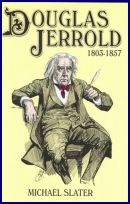The Guardian Classics, Saturday December 14, 2002
The nearly man: Kathryn Hughes appreciates Michael Slater's Douglas Jerrold,
the story of a Victorian literary star to whom time has not been kind
Douglas Jerrold: A Life (1803-1857)
by Michael Slater
351pp, Duckworth, £25

Douglas Jerrold: A Life (1803-1857)
by Michael Slater
Dickens-Jerrold-Thackeray were not just writers with a thundering rhetorical presence - there were plenty of others who had that - but they dominated the periodical publishing industry as editors and even owners, controlling the media through which their stories, sketches and satirical bits and pieces were delivered to the public.
Where Jerrold differed from Dickens and Thackeray was that his work was perfectly adapted to the places in which it appeared. He was master of the short comment piece, the first-person rant, the comic turn, all of which exactly suited the pick and mix format of a new generation of magazines such as Douglas Jerrold's Shilling Magazine, The Illuminated Magazine , and the publication with which he became most associated, Punch . Jerrold was a columnist, not a reporter, and his beat was the folly (‘wickedness’ was his preferred word) of British society as it buckled under the pressure of the ‘Hungry Forties’. A sentimental radical with a touching belief in the goodness of children, pretty women and rustics, Jerrold's loathing was reserved for smug bishops, grabby merchants and cruel commanding officers (he had served an apprenticeship in the Royal Navy). His prose, when focussed on these targets, was as sharp, mocking and effective as anything his equally famous friends ever produced.
The thing was, though, that Jerrold could not do novels, and that is why his celebrity has faded. Whenever he tried - there were three attempts in all - he sounded like a second-rate Dickens, all digressive whimsy punctuated with patches of embarrassing tub-thumping. Where he scored better was as a dramatist. Like Dickens, though unlike Thackeray, who always harped on about being born a gentleman, Jerrold's creative imagination had been nurtured by his early experiences in the theatre. The son of strolling players, his odd, stunted appearance meant that he would never hack it in front of the curtain. Still, he understood perfectly the requirements of an industry which gobbled up material like a vast, boiling monster (all over London there were tatty little theatres staging a different burletta, farce or melodrama every week).
It was in this context that Jerrold wrote longer pieces that achieved something approaching fame. Black-Eyed Susan, commissioned in 1829 by Robert Elliston, manager of The Surrey Theatre in Blackfriars was, by anyone's reckoning, an original and finished piece of work. Drawing on Jerrold's own naval background, it yanked the theatrical British tar off the foredeck and placed him in his own home, a broken-down cottage in Deal. Instead of gung-ho jingoism (this was only 14 years after Waterloo), Jerrold gave the astonished audience a quiet drama of domestic working-class life. Susan proved a huge and unlikely success.
It did not, unfortunately, make Jerrold rich. Right through until his death in 1857 aged 54 he was scrabbling around for money, starting up magazines and knocking out pieces in a desperate attempt to stay one step ahead of the rent (for one bleak six-week period he was even banged up for debt). Michael Slater, who has for years written brilliantly about Dickens as a harried man of letters, perfectly captures the hectic, breathless feel of life as a journalist in early Victorian London. Part artist, part intellectual and, unless lucky enough to have a private income, a very large part tradesman, the mid-19th century writer ricocheted from one fly-by-night magazine office to another. Yet amid all this wheeling, and dealing there could be discerned an earnestness of purpose. Most of these young men had not been to university, yet they gathered in the evenings, as Jerrold and Dickens did in their early days, to talk about books and argue about politics.
Until 15 years ago, journalism was a Cinderella subject of 19th- century studies. Contemporary newspapers and magazines tended to be used either, condescendingly, to provide ‘background’ or, naively, to prove the state of public opinion on the great issues of the day. Thinking has since moved on. Periodical journalism, with its capacity not simply to reflect the world but to create it, now seems perhaps even more important than great slabs of classic literature.
Jerrold, and others like him, was engaged in a complicated dance with their reading public. They lead them to new subjects and new ways of thinking, but they also responded swiftly, trimming their course if the reaction was hostile (Jerrold may have been a man of integrity but he had to sell newspapers).
The paradigm is not an easy one to work with, but it is rewarding. And Slater, in this excellent book, goes some way towards restoring ephemeral writing - and writers of ephemera - to their rightful place as makers, and not just recorders, of our collective cultural life.
More Jerrold Pages...
Other links:
Family Trees
Links Page
Home Page
Silent People